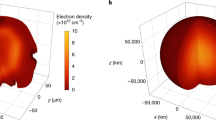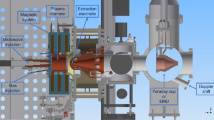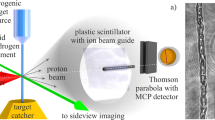Abstract
ATTEMPTS to find the optimum conditions for producing a highly ionized plasma in hydrogen have recently been described1. A microwave source was used, and the discharge tube was immersed in a magnetic field. It was found that a more efficient transfer of energy from the micro-wave field to the plasma took place when the operating frequency equalled the electron cyclotron frequency. We have carried out preliminary experiments to discover if such a selective absorption occurred when the applied frequency was equal to the ion cyclotron frequency. This frequency is given by F = eH/2πmc, where H is the magnetic field strength and m is the ionic mass.
This is a preview of subscription content, access via your institution
Access options
Subscribe to this journal
Receive 51 print issues and online access
$199.00 per year
only $3.90 per issue
Buy this article
- Purchase on Springer Link
- Instant access to full article PDF
Prices may be subject to local taxes which are calculated during checkout
Similar content being viewed by others
References
Buchsbaum, S. J., and Gordon, E., Quarterly Progress Report, Massachusetts Institute of Technology Res. Lab. of Electronics (Oct. 15, 1956).
Walsh, D., and Shearman, P. M., J. Sci. Instr., 34, 161 (1957).
Author information
Authors and Affiliations
Rights and permissions
About this article
Cite this article
BRIGHT, A., RAMANATHAN, K. Discharges in Hydrogen at the Ion Cyclotron Frequency. Nature 180, 1468–1469 (1957). https://doi.org/10.1038/1801468a0
Issue Date:
DOI: https://doi.org/10.1038/1801468a0
Comments
By submitting a comment you agree to abide by our Terms and Community Guidelines. If you find something abusive or that does not comply with our terms or guidelines please flag it as inappropriate.



